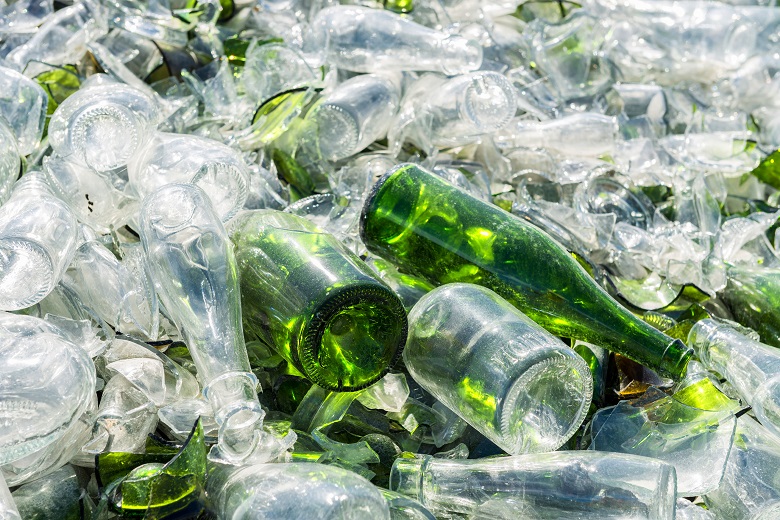
A Melbourne council has declared war on glass in recycling bins, saying it contaminates other materials and and prevents them being recycled.
Five months after implementing its ban on glass in general recycling and providing residents with a glass-only bin, Yarra City Council says it has achieved significant results.
Project Officer Joe Agostino says the trial involved 1,300 Abbotsford households, which were given a new bin and an ultimatum: separate your glass or we won’t pick up your recycling.
Council also reduced weekly garbage collection from once a week to once a fortnight and introduced two new bins.
Residents in the trial area now get mixed household waste, recycling and glass picked up once a fortnight, and food and green organic (FOGO) waste collected once a week.
“The number one focus was getting the glass out of the comingled recycling, and getting clean glass and clean recycling,” Cr Agostino told Government News at Waste Expo Australia after providing an update on the trial.
“Glass is a contaminant the way we’re picking it up at the moment. If you look at the co-mingled system, you’re mixing everything in – it goes into the bin, into the truck and gets compacted. Then it goes to a processing plant where it gets crushed and it just contaminates the rest of the material,” he said.
“So by taking the glass out, we were trying to achieve two things – how much glass could we recycle for new glass, and what effect would that have on the other co-mingled recycling.
“The FOGO was purely getting organics out of the landfill stream.”
Pleasing results
Council has been thrilled with the results.
“The results have been good,” Cr Agostino says. “It took us a while to get glass out of the co-mingled bin, but we’re now down to about 0.2 of one per cent, which is negligible.”
Forty per cent of glass was diverted from mixed bins – the equivalent of 3,500 tonnes per year – and the separate glass recycling resulted in up to 95 per cent of glass being recycled, compared to 45 per of glass in co-mingled bins, Cr Agostino said.
Forty-three per cent of food and green waste, or the equivalent of 6,500 tonnes per year, was diverted from landfill as a result of the FOGO initiative.
‘Shock therapy’
Cr Agostino admits the trial was “shock therapy” for some members of the community but firmly believes that recycling bins must be respected.
“The focus for us was, can we change human behavior? Can we reduce the amount of waste that we generate? The second focus was, can we improve the quality of all the recycling material and extract as much resource as possible?”
He says Australia made a huge mistake when it adopted mixed recycling.
As far as Yarra Council is concerned, there’s no going back now, he says.
“We’ve just got to admit we got it wrong. Let’s just get back to collecting it separately,” he says.
Yarra City Council was not affected by the recent decision of recycling operation SKM to stop accepting recyclable materials. Kerbside recycling is currently transported to Polytrade in Dandenong for processing.
Comment below to have your say on this story.
If you have a news story or tip-off, get in touch at editorial@governmentnews.com.au.
Sign up to the Government News newsletter
Everything should be collected separately. Let the user do the sorting. That way there is less contamination and less wastage. Other countries provide up to six small bins one each for a different type of recyclable – one for glass, one for plastics, one for paper and cardboard, one for aluminum cans, one for steel cans and one for other recyclables like printer cartridges and batteries. If the loads are presorted they can then be quickly dispatched in containers via freight train to various specialist recycling plants across the country where they could be processed into finished products and freighted out again. I have a vision of seeing a lot of smaller, specialist recycling plants established in small rural and regional towns which are already situated on branch lines. Some of those branch lines are still in operation and some are closed, but could easily be re-opened. Along these rail corridors are situated dozens of disused, government-owned bulk storage facilities which are enormous in size and which would easily accommodate both the machinery and the warehousing necessary to establish these smaller, specialist recycling centres. And as they are already situated on rail sidings, loading and unloading goods would be carried out without any disruption to other normal rail traffic. If this was to happen, jobs would be created in small rural towns which desperately need more employment opportunities and our waste recycling woes would be over. In other words, let’s “kill two birds with the one stone”. All the government has to do is give its blessing for those bulk storage facilities, which are now standing idle, to be leased out and repurposed. But “Blind Freddy” can see that this solution is a “win-win” not only for the government, but for the environment as well as all those people hungry for jobs in those small struggling towns and villages right across the Nation. So let’s just get on with it.